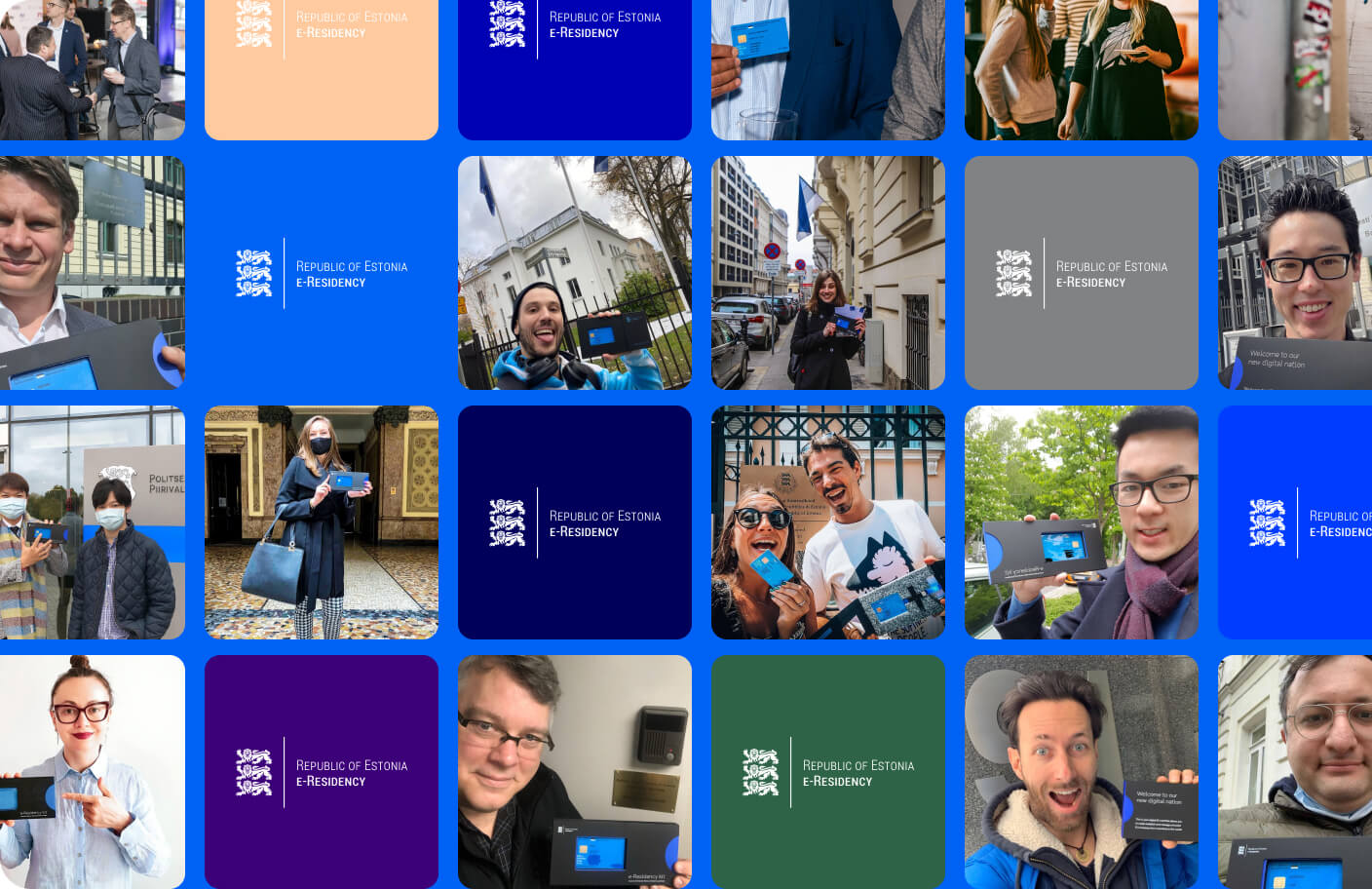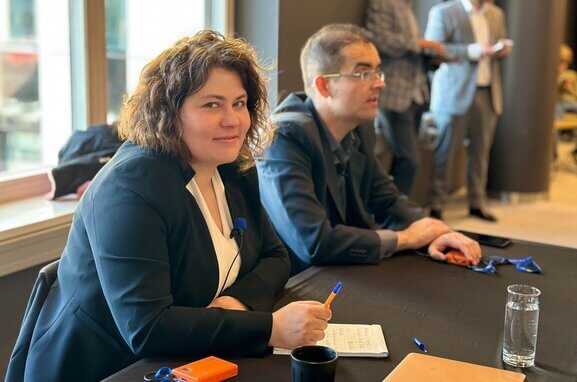e-residency for interpreters
Looking for a business solution for your professional interpreting enterprise? Consider e-Residency of Estonia - a fully digital, location-independent way to structure your work.

Estonian e-Residency has provided a path to diverse entrepreneurs from around the world, to operate flexible business entities. From solopreneurs to global collaborations, such enterprises frequently cross boundaries of countries, cultures, and languages. A perfect example are professional interpreters, for whom e-Residency can offer an easy, digital business solution for organising your work.
Among the many professionals involved as a result, are those whose job it is to interpret, between one language and another - professional, certified interpreters. Ensuring no nuance or intention is lost or corrupted, in detailed and often crucially important conversation, is an art which takes years to master accurately.
Interpreters also work across borders, require a digital solution to manage their affairs, possibly a reputable legal structure for some clients too, especially for public sector contracts. Estonian e-Residency and a private limited company or OÜ and operating under the Interpreting/Translation field of activity (with EMTAK code 74301) can professionalise and streamline the business of interpreting, while not obstructing the interpersonal connection and individual approach required.
How many e-residents are Interpreters?
There are at least 137 e-resident companies operating as Interpreters or translators.

The art of interpretation
Unlike translation, which deals with written text, interpreting focuses on the spoken word, requiring interpreters to possess excellent listening and speaking abilities in multiple languages. These professionals play a crucial role in high-stakes environments such as international conferences, legal proceedings, and diplomatic meetings.
Interpreters must navigate the nuances of language and culture in real-time, making split-second decisions to convey messages accurately and coherently. This requires not only linguistic expertise but also an in-depth understanding of cultural contexts. They work in varied settings, each presenting its own challenges.
On the one hand, interpreters are used to dealing with the complexities of different cultures, norms, and institutions within the countries they work. While, on the other hand, they often face difficulties as globally mobile entrepreneurs, needing to reconcile different legal structures, currencies, taxes, and business cultures.
There are two main modes of interpretation work: Simultaneous, and Consecutive.
Simultaneous Translation
Simultaneous interpreting, where the interpreter translates the speech as it happens, requires immense concentration and the ability to think quickly. To see it in action is almost magical, as though they were reading aloud from the mind of the speaker - but in a different language altogether.

Estonian interpreter Anna Bogdanova, who specialises in Portuguese and Spanish interpreting, explained to me what this is like for the professional involved:
“It’s typically used in conferences, and you work in a special soundproof booth with special equipment. As you hear the speaker, you talk directly into the headsets of the clients who need interpreting, almost in real-time with the person giving the speech.”
This approach was first used prominently at the Nuremberg trials in 1945, where the judges, defence and prosecution teams, and defendants spoke four different languages, and fair trial depended upon proceedings that everyone could understand. The interpreter relays the meaning immediately and continuously.
Since Nuremberg, the profession of interpreting has grown to become a crucial part of international diplomacy, strategy and decision-making, including in the UN, EU, and other multilateral organisations.
If interpreting is your profession, you know that your role is vital as the world faces rising threat levels from climate change to geopolitics. Interpreting done well helps to ensure nuanced and effective communication and collaboration for collective problem-solving. Simultaneous translation is how powerful people and interests get things done together.
Consecutive Interpreting
Consecutive interpreting, on the other hand, involves the interpreter speaking after the speaker has finished.
It demands excellent memory and note-taking skills, along with great attention to the intended consequence of the communication overall. It’s commonly used in small meetings and legal proceedings, including arbitration proceedings, depositions, hearings, and trials, as well as interviews, and it means switching languages repeatedly back and forth during a conversation.
“As part of consecutive translation, you might rephrase or summarise the content a little, so a 5-minute speech might come out as 4 minutes of interpreted speech,” Anna explained. “But it’s essential that you don’t omit anything important. You just avoid pauses and repetitions.”
If you - like Anna - are working as an interpreter at an unthinkably intense level, you probably dread having to complete the administration necessary to operate your activities and get paid. Consider e-Residency, a seamless, digital key to a safe, reputable legal structure for your interpreting services.
The day-to-day work of interpreting
Simultaneous and consecutive interpreting each have their optimal use cases.
Consecutive and simultaneous translation are often used at the same event, or interchangeably as conversation unfolds or shifts to different formats - conference keynotes, to breakout sessions, for example. Consecutive interpreting can provide more time for parties to digest and understand information, and thus make for more considered conversations or debates. On the other hand, simultaneous interpretation can allow more authentic debate with immediate reactions and the active use of all five official languages, while also saving time and money.
An easy, digital way to work
E-Residency helps you focus more on interpreting, and less on administration.

Whichever the approach, the diverse and challenging nature of the work is demanding and high pressure. No-one hires a professional interpreter for trivial or low-stakes conversations - they’re called in when it really matters. Here are three interesting interpreting cases - from the professional to the side-hustle.
1. Global Communications: Showcasing Estonia in Diverse Conversations
As a full-time interpreter, Anna’s work is varied, and her deepest specialisation is in the niche language intersection of Brazilian Portuguese and Estonian, (though she also works professionally in Spanish and Russian as well.) She has interpreted at webinars, beauty trainings, trade events, legal sessions, and extensively in education - helping to showcase Estonian business and services to international delegations.
When you consider the high-stakes nature of so many conversations requiring this input, and the fact that the interpreter may be the only person in the room who understands exactly what’s going on for everyone, it’s hugely important work.
“You have to study, you have to prepare if it’s specialist material,” she continued. “And you have to be available to work for the whole duration of an event like a conference, even if you’re not always called on.
“So you have to have a high hourly rate, and be available to travel, it’s hard.”

By operating as a professional small business with relevant qualifications and certificates, Anna and her peers are raising the standard globally, while ensuring they can invoice and get paid in any currency.
While Anna has an MA, she also maintains her professional development through continuous upskilling, an essential part of professional interpreting. She can invest in this as a business expense, further supporting her choice to operate as a distinct entity in Estonia, where pre-tax business-related expenses are easy to account for.
Like Anna, e-residents can leverage these and other benefits of doing business in Estonia. Anna is an Estonian citizen, so she doesn't need e-Residency (and, in fact is ineligible!) But over 110,000 foreign entrepreneurs from around the world have become e-residents since 2014 and started over 29,000 companies. Interpreters could join this growing, global business network too.
E-Residency offers more than just a business structure; it provides a gateway to enhanced professional credibility, financial fluidity, and operational flexibility, in a forward-looking global network.
2. Crucial Conversations: Interpreters and Immigration
Gheorghe Siminiceanu doesn’t work at the UN or big conferences. He works under contract for the Department of Work and Pensions in the UK, where he translates between English and his native Romanian. The conversations relate to immigration, benefits, and other highly sensitive dialogues, where accuracy is critical - the outcome can impact where and how someone gets to live.

Gheorghe has attended trainings as a community interpreter, and been subject to extensive background checks. He splits his time between the UK, Spain and Romania, but would like to relocate to Spain permanently and officially. It's tricky though, even with a European passport, because of the ad-hoc nature of the work, and the complexities of cross-border accounting and taxes.
Indeed Spain, one of the fastest growth markets for Estonian e-Residency, can make it very difficult to compliantly register and be taxed for work which is sporadic, unpredictable, and international.
“I work for the DWP through a third-party company, who deals with all their interpreting needs,” Gheorghe he explained. “Usually we use their app to log in and show our availability and everything. But sometimes when it’s urgent they call us directly.” He may have to go to a hospital or job centre - often at very short notice - to deal with a conversation, but he also works online.
There is some irony here. On the one hand, interpreters are used to dealing with the complexities of different cultures, norms, and institutions within the countries they work. While, on the other hand, they often face difficulties as globally mobile entrepreneurs, needing to reconcile different legal structures, currencies, taxes, and business cultures. This is where e-Residency could be a great solution for interpreters, including those wanting to live in sunny Spain.
3. Hospital Interpreting: Supporting and Advocating for Patients
Some even operate completely under the radar, like Sarah*, who did not want to be identified. She is a British nurse, retired in Spain, and very concerned not to jeopardise her resident status as a pensioner. But a few years ago, she started volunteering with a language team at the local hospital, in an expat-heavy region of the Costa Blanca.
“We have a desk in the main reception every morning, and try to make sure there’s someone on hand who can cover English, German… We have other volunteers who speak Dutch and French as well, and can help patients, staff, and guests deal with questions and a need for information,” she explained.
“But then patients started hiring me to accompany them in the appointments one-to-one, and I can charge for that. It’s really essential they understand their results and advice, and also get their questions answered. While some of the consultants do understand English, it’s not fair to expect them to consult in it professionally. So I protect them, and make sure both sides don’t miss anything.
“I also help them deal with making follow-up appointments and booking tests and things, especially if they’ve had bad or unexpected news,” she explained. “I might call in a day or so to see if they wanted to ask about anything that got discussed, or just to see if they’re alright. We have local groups that I can put them in touch with to support with cancer or dementia, in English, if they need it.”
Become an e-resident
Professionalising the international conversation
Sarah has decades of medical background, but no formal language or interpreting skills. She can’t professionalise or advertise her vital work, without putting her pension benefits at risk - so she acts more or less as a volunteer, with paid tips for one-to-one appointments.
On the other hand, Anna has a legal framework for her service, because - like so many Estonians - she operates a private limited company. This enables her to contract with any private or public sector organisation in the world who might need her expertise, and promote and package her skills in a global marketplace.
Do you provide interpreting services in a professional setting, like Gheorghe or Sarah? Consider organising your enterprise within the limited liability structure of an Estonian OÜ, thanks to e-Residency.
Start a company in Estonia
Register 100% online and really fast. Become an e-resident, access e-services with your digital ID, and lean on a network of supportive service providers.

Advantages of e-Residency for Interpreters
So, how could e-Residency work for interpreters?
While AIs might handle text-based translations pretty effectively, the human touch remains vital and at the heart of cross-cultural conversations and diplomacy.
Combining this intuitive understanding with the most efficient international framework for business operation (Estonia), is the perfect foundation for a future-focused solo enterprise.
Becoming an e-resident and trading as an OÜ has many distinct advantages, for interpreters, such as:
- An EU-based business entity makes it easier to contract and transact with clients all over the world, in different currencies and jurisdictions
- Limited liability protects them contractually from the weight of responsibility associated with their work and the important communications for which they might be solely responsible
- Along with recognised qualifications and standards, and greater ease of obtaining professional indemnity, trading as a registered business rather than an ad-hoc freelancer boosts the perceived expertise and credibility of the provider
- Pay yourself through either salary, director's fee or dividend, depending on the optimal mix and tax implications
- Smooth income over time, and manage expenses and resources within the business entity, rather than messy personal/freelance accounting.
For interpreters like Gheorghe and Sarah (and Anna were she not Estonian!), operating an e-resident business offers ease and stability, in a profession marked by transience and unpredictability.
E-Residency offers more than just a business structure; it provides a gateway to enhanced professional credibility, financial fluidity, and operational flexibility, in a forward-looking global network.
Have questions?
Come and join one of our live webinars and get answers to all your questions about e-Residency and running a company in Estonia!

More from e-Residency
- Sign up for our newsletter
- Watch fresh video content - subscribe to our Youtube channel
- Meet our team and e-residents - register for our next Live Q&A
